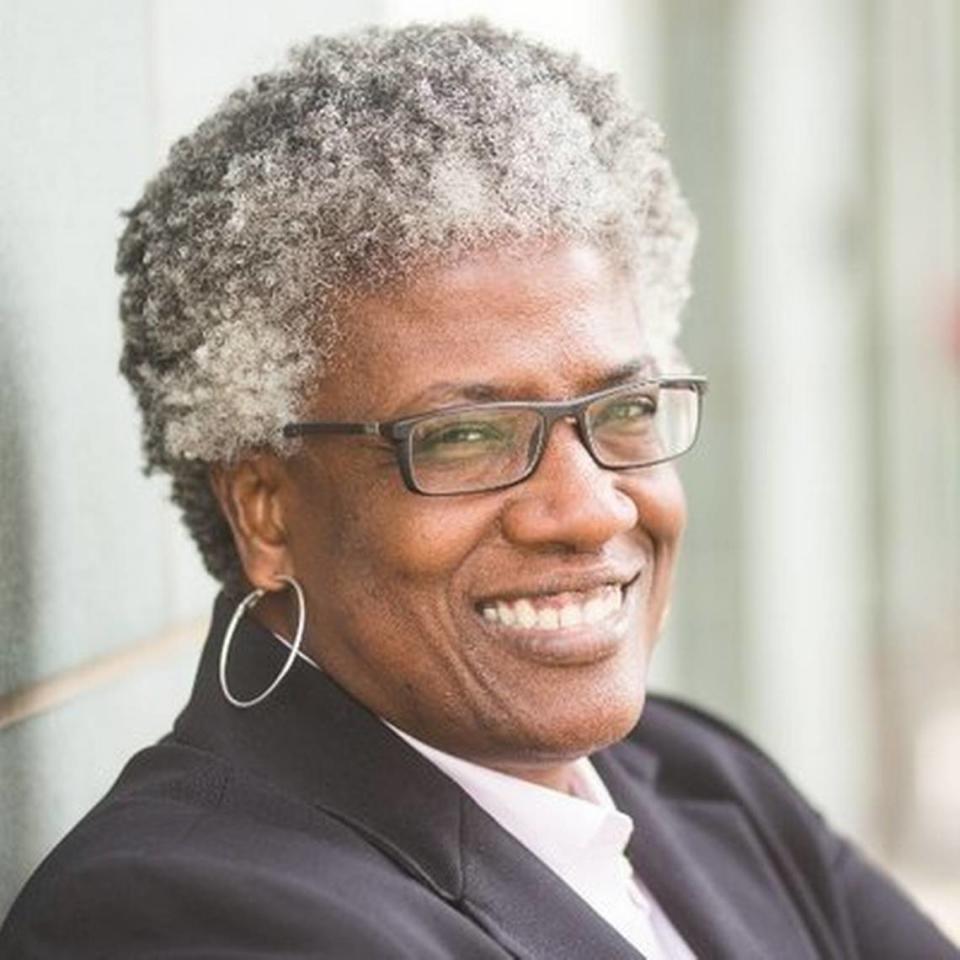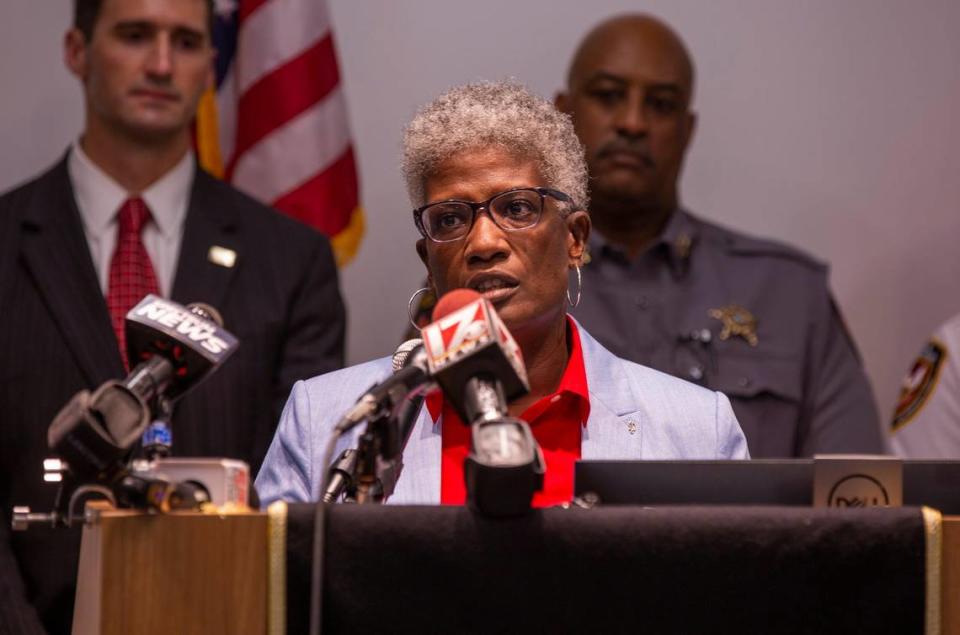Durham DA reflects on Black women in leadership. ‘We’ve never seen a moment like this’
Satana Deberry was elected Durham County district attorney in 2018 amid a nationwide wave of progressive prosecutors.
Deberry is not a career prosecutor. She spent a few years in criminal defense early in her career, but was executive director of the N.C. Housing Coalition when she was first elected.
She promised a culture change in how crimes are prosecuted, a platform she says was shaped by her identity as a Black woman, and coasted to a second term last year.
Deberry, 54, spoke with The News & Observer about the new era of Black female leadership in Durham.
Durham stands out in this state, but does this time in which so many of the local positions are occupied by Black women feel unique even within Durham’s history?
Even within Durham’s history, I don’t think we’ve ever seen a moment like this.
I think there have been intermittently Black women in leadership positions. Certainly there have been Black women in community leadership positions, but in actual political and policy-making positions, not so much.
How did this shift come about?
There has been over the last century the buildup of Black political and community power in this community for various reasons. One is North Carolina Central. One has been the kind of historic disinvestment in Durham over time. There’s Black Wall Street. And as there was white flight to Wake County and other places like that, there was more opportunity for Black leadership in the schools and local government and community-based organizations.
And those are the type of things that build up generation over generation. Sometimes what you see in these type of situations is it seems like something happened overnight that was actually building for a very long time.
What were your first impressions of Durham?
I first came to Durham in the fall of 1991 (to attend law school at Duke University). It was a very different place then. It was a much smaller city. And I just really loved the atmosphere of Durham. I loved the community.
Is this a place where you felt recruited, encouraged and supported in your leadership journey?
What I felt in my leadership journey was safe and not different.
One of the things I think that is hard to find for a lot of Black people in general, is just a diversity of Black experience in numbers, and Durham has that. Durham has people from all walks of life doing all types of things. And so it gives you as a Black person, especially as a Black woman, a certain freedom to choose what you want to do. And to not feel like you’re always going to be the only person in the room.
That not just builds competence but it builds a pipeline of leadership, and accomplishment, and ability, and networks. All of the things that you need to not just eventually run a political campaign and win it, but also rise in the ranks of something like city or county government.

Whose shoulders do you feel like you stand on?
My grandmothers were huge influences in my success. I grew up in rural North Carolina and my grandmothers were leaders in school, in church. I come from a family of teachers: both my parents were teachers; my grandparents were teachers; my siblings are teachers.
And so I feel like I stand more broadly on the shoulders of Black educators in North Carolina. You know, people who were not just educating the next generation of folks, but were also leaders in their community.
My personal heroes — Barbara Jordan. When I was a little kid I saw her give a speech at the Democratic National Convention nominating Jimmy Carter for president. I remember seeing her stand up there, and she was the first person I’d ever seen on television in a position of leadership who looked like my mother and my grandmothers and aunties. And I just followed her career from then on.
Do you feel like your identity as a Black woman helps you make inroads or build trust in new ways?
Yes. I think Black women are uniquely situated to really understand the criminal legal system and to really be policymakers within it. And the reason I say that is because we are the ones who I think are most likely to be victims of violent crime. We are the parents of Black children. Whenever you see a young Black person who has been killed by the police, the very first person that you hear speak about it, generally, is the mother.
And as the Black mother of Black children, I have more invested in a fairer, more just system than almost anybody else.
What does this new era of Black female leadership look like day-to-day?
I’ve had many situations where I’ve been the “only” in the room. I don’t have that currently. We don’t all politically line up in the same way. We all have different points of view. We all have different ways in which we interpret our policies, the law, how we respond to community. And our personalities are just as different as anybody’s.
What I think does make a difference, though, is we come in with a understanding of what each other has been through. And we understand that while we all we may not now be the only in the room, that certainly has not been our history. Right?
I graduated from law school almost 30 years ago — that’s crazy — and it was it was hard to find another Black woman in any setting. I was decades into my career and still being confused, or asked to bring coffee, or being restricted from using the lawyer entrance or being asked to show my Bar Card, when white male attorneys just had to have a suit.
We all have those experiences. And I think what that means is that we just come more respectfully to our spaces.

Do you still encounter biases, discrimination, stereotypes?
Oh, sure. I mean, even since I’ve been DA, you know, I’ve had sheriff’s deputies who didn’t know who I was and tried to restrict me from doing certain things in the courthouse. It never stops. It is always a thing.
Is there any community among fellow Black women in your position across the country?
I have over my first term probably met almost every other Black woman in the country who is an elected prosecutor. You probably say, “Wow.” There are only 2,200 elected prosecutors period in the United States and less than 1% of those are Black women, so it’s not a lot of people to meet.
And so I’ve probably met them all, and built some type of relationship or acquaintanceship with most of them.
How do you hope that the world and Durham will be different for the women and girls who will follow in your footsteps?
I hope that people are looking at me and at what’s happened in Durham and think, “Oh, I can do that.” Like it doesn’t even seem hard to them.
I hope there are a bunch of girls out there that they see what we’re doing and aspire for that for themselves. Or don’t! You know, like say, “Oh, yeah, I could be DA, but what I really want I want to be is an astronaut.”
That there are things that they can discard as well as things that they can achieve.
This conversation has been lightly edited for length and clarity.

